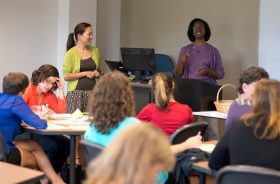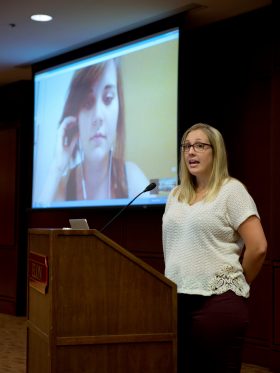The 12th Annual Teaching & Learning Conference at Elon University encouraged hundreds of professors from across the nation to seek creative approaches to educating their students.

After all, for every 3D printer on a college campus, there’s a pair of Google Glasses collecting dust in someone’s office drawer.
That’s why Professor Megan Squire offered a checklist of considerations on Thursday for hundreds of professors visiting campus for Elon University’s 12th Annual Teaching & Learning Conference. Does it “scratch an itch?” Would you still use the technology even if it takes twice as long, or costs twice as much, as what you anticipate? Would you spend your own money on the technology? Are you OK with failure if it doesn’t work?
“If you can say, ‘kind of, yeah!’ about a lot of these checklist items, I say go for it,” Squire told her audience at the conference’s closing session in LaRose Digital Theatre, one she titled “Coping with the 21st Century Pace of Change: Classroom Strategies from the Front Lines.”
And if you are an early adopter of technology, she said, be honest about its pros and cons. “You need to share your experience with other people,” said Squire, a professor of computing sciences.
Squire’s talk capped a daylong program sponsored by Elon’s Center for the Advancement of Teaching and Learning, and its Teaching and Learning Technologies office, aimed at helping educators make lasting impacts through innovative assignments and classroom activities.
More than 320 people pre-registered for the conference, whose theme “Designing Engaged Learning Experiences” included workshops on book publishing, flipboard magazines, service-learning and ways to engage students during classroom discussions, among other topics.
Twenty Elon faculty and staff members led various workshops, with professor from another half dozen regional universities also directing breakout programs.

Elon senior Maria Temming, a physics and creative writing major with a minor in astronomy, joined the conferenced by online video while Stephanie Bedard, a junior international business major, spoke in person about their tasks of using iPads and blogging reviews of the apps they downloaded.
“The more I practiced, the better I got,” Bedard said of her experience writing on the iPad. “When I look to where I was a year ago, I can say I’m a much more confident writer now.”
The conference opened with an opening session led by Michael Palmer, an associate professor of chemistry and associate director of the Teaching Resource Center at the University of Virginia. His talk, “Pink Hippos, Infinity Dreams, and Other Mysteries of Engaged Learning,” explored the nature of engagement and ways to design learning environments that “make engagement irresistible.”
Deandra Little, an associate professor of English and director of the Center for the Advancement of Teaching and Learning, said the conference was intended to share with faculty from across the country some of the engaged learning practices and priorities valued at Elon University.
“I’m hoping people take away at least two practical ideas they can incorporate into their courses,” Little said, “but I also hope they get a sense of the range of creative possibilities in the classroom.”
For more information on the 2015 Teaching and Learning Conference, visit http://blogs.elon.edu/tlc2015/program/


